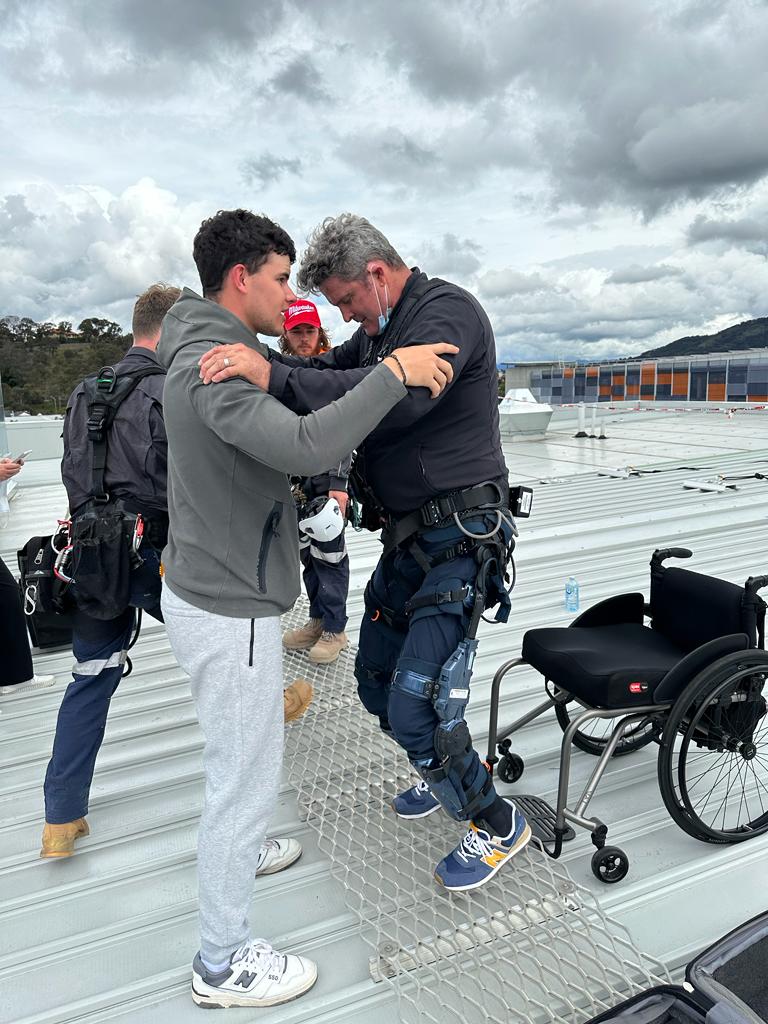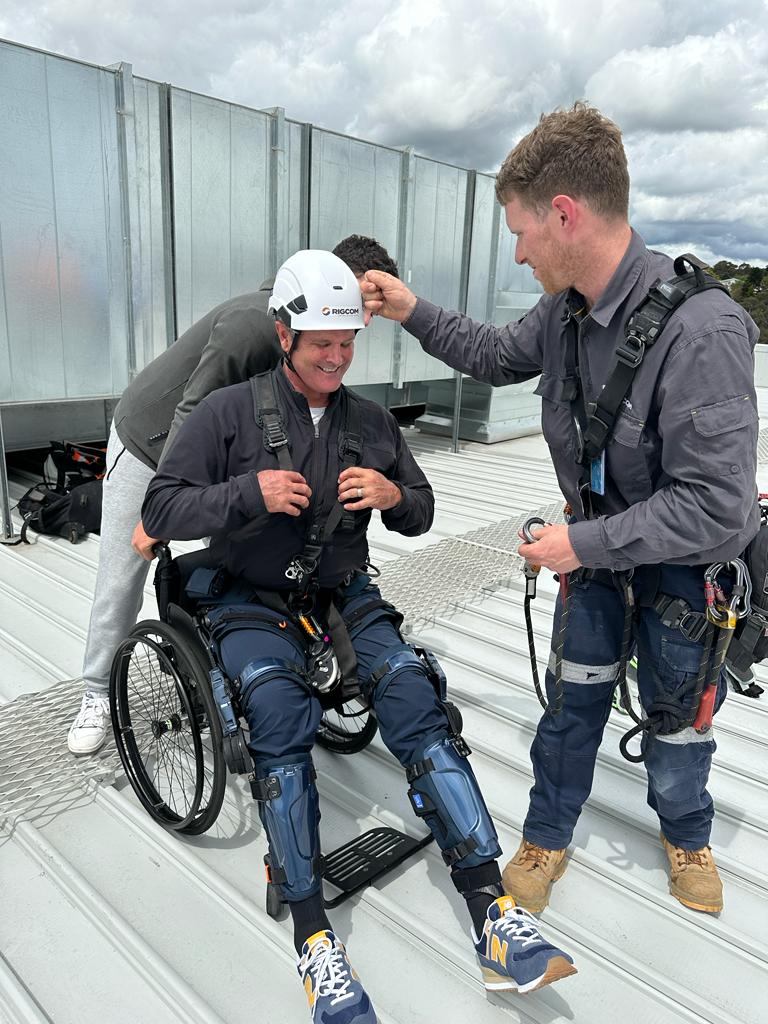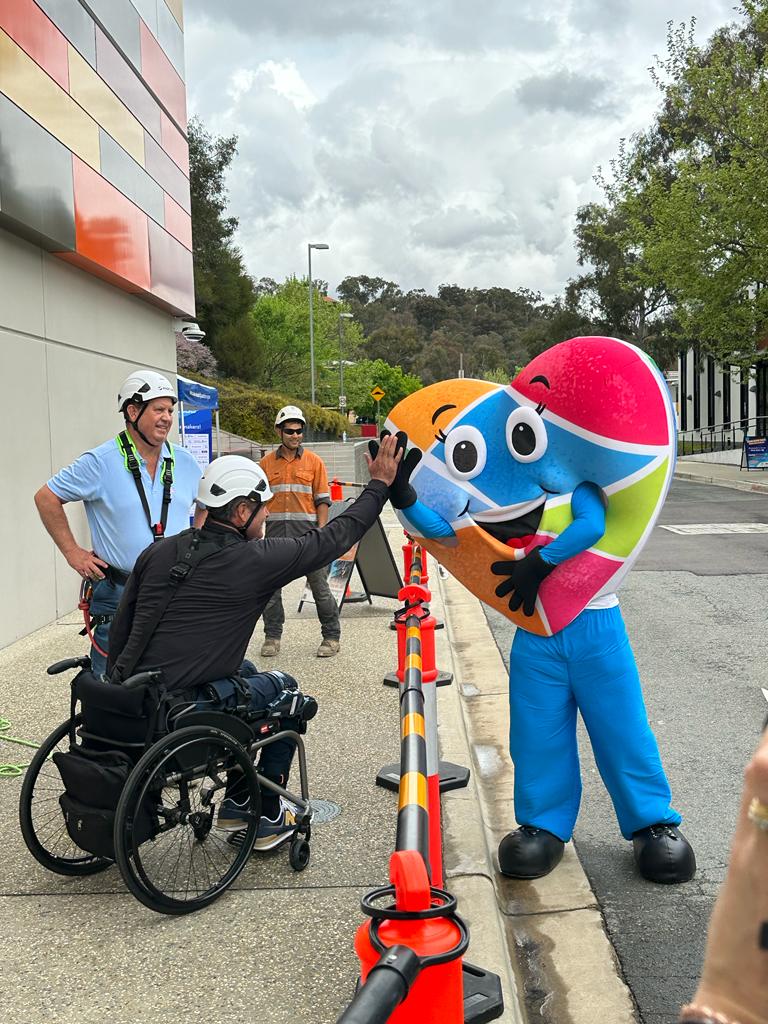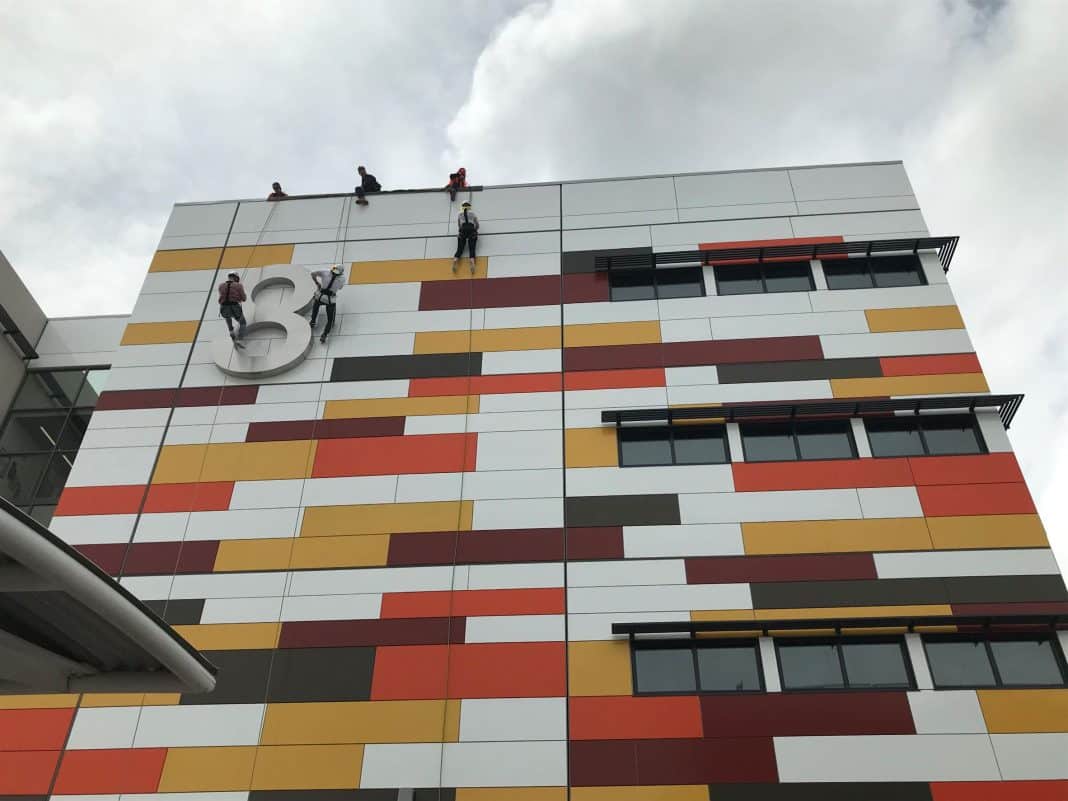Last year, New Zealand cricket champion and long-time Canberra resident Chris Cairns suffered a spinal stroke that left him unable to walk – one of three life-threatening health crises Cairns has faced since August last year. Today, he abseiled 18 metres down Canberra Hospital’s Building 8, thanks to a robotic exoskeleton being trialled at the University of Canberra Hospital.



Mr Cairns is an ambassador for the Canberra Hospital Foundation, which holds its annual fundraising day, Can Give Day, today. He had, a CHF spokesperson said, been through almost every hospital department.
“I’m a definite user of the system,” Mr Cairns said. “The health system here in Canberra saved my life.
“Health care is only something you need when you need it. To be able to have the health care professionals, the support specialists, and the environment for me to recover and rehab – I’m a very lucky man to be here.
“For me and my family, it was a lifesaver.”
Funds raised through Can Give Day support clinical trials and medical research in Canberra, therapeutic and supportive programs, transformations and refurbishment of away-from-bed spaces, and the purchase of speciality medical equipment – like robotic technology.
This year, the Foundation has set a target of $300,000, but hopes to raise $1 million.
“The goal is ambitious – but if we can do that, then that’s a wonderful thing,” Mr Cairns said. “The system worked for me again and again.”
Last August, Mr Cairns suffered an aortic dissection (a tear of the aorta), where blood leaks out into the system, causing multiple organ failure. It can be mistaken for a heart attack, and can be fatal if not diagnosed quickly; fortunately, Canberra Hospital diagnosed the condition in time.
Mr Cairns was put onto a heart and lung bypass machine (ECMO) and had four surgeries on his heart because of complications.
When he regained consciousness, weeks later, it was discovered that he had suffered a spinal stroke, leaving him temporarily paralysed from the waist down. He began rehabilitation at the University of Canberra Hospital (UCH), trialling the exoskeleton, which he used in today’s abseiling fundraiser.
In February this year, however, he was diagnosed with bowel cancer. But, he said: “It’s a funny thing, because if I hadn’t been in UCH, that diagnosis might have come a lot later.”
Mr Cairns will finish his six-month chemotherapy course next week. It will take two months to flush the drugs out of his system.
“I’m looking forward to getting some energy back and then getting out. There are many, many things available out there for people with disability. So I’ll be exploring all sorts of things, that’s for sure.”
This time a year ago, he was not sure what life would entail – certainly not abseiling. “It’s actually quite nice to be able to do something exhilarating!” he said. That, he misses.
“I can’t do some of the things that I want to do, or to go and do on the spur of the moment. To be able to do something like this is great.”
The spinal stroke obliterated Mr Cairns’ neural pathway, and the muscles atrophied, but the robotic exoskeleton provides stability for him to stand and move around. He says the neural pathway is finding its way back. “I’m getting more and more movement all the time.”
But, Mr Cairns says, it will take years to rebuild muscle mass. “Years and years of working every day and brick on brick on brick upon brick. When you look back, you can see what you build, but it takes time.”
Only 2 per cent of all strokes are spinal strokes, he explains, so the literature and the data on it are not prevalent.
Mr Cairns does not know whether he will ever be able to walk again. “You just have to keep going and building that strength up.”
Fortunately, he is familiar with the long process of rehab, from injuries sustained over his 20-year cricket career.
“I know how single-minded you have to be to push yourself,” Mr Cairns said. “That’s one thing I could be thankful for from my previous life.”
Patience, though, is something he has had to learn. “This is about the journey, not the destination, because the destination may be years away. So you can’t get caught up too much on specific goals.”
Mr Cairns seems someone who looks on the bright side. “You have dark days; you wouldn’t be human if you didn’t. And so you just have to realise what your purpose is – for me, it’s my kids, my family.”
His mother, wife, and one of his sons were at Canberra Hospital today to watch him abseil.
“I’m an unbelievably lucky man to be here, I should be dead. So every day for me is a good day. You just have to have to keep pushing yourself, reminding yourself what you’re doing and what’s happening, and why you’re here. But give yourself those days where you feel a bit down, a bit lonely, and what not, but then get up and get back into it.”
Mr Cairns was one of 11 business and community leaders who abseiled 18 metres down the hospital’s multi-storey Building 8 to raise funds for the Canberra Hospital Foundation.
The others were Deborah Rolfe AM, chair of the Canberra Hospital Foundation; Dave Peffer, CEO of Canberra Health Services; Susan Freiberg, executive director of Canberra Health Services, Centenary Hospital for Women Youth and Children; Richard Rolfe AM, of Rolfe Motors; Archie Tsirimokos, of Meyer Vandenberg Lawyers; Amanda Whitley, of Her Canberra; Christine Shaw, of Blackshaw Real Estate; Jane Gunn, of KPMG; Ron Shepherd, of Advantage Advertising; and Tane Patchett, of Multiplex.
To donate to Canberra Hospital Foundation CAN GIVE DAY, visit canberrahospitalfoundation.org.au/cangiveday2022
Canberra Daily is keen to hear from you about a story idea in the Canberra and surrounding region. Click here to submit a news tip.



